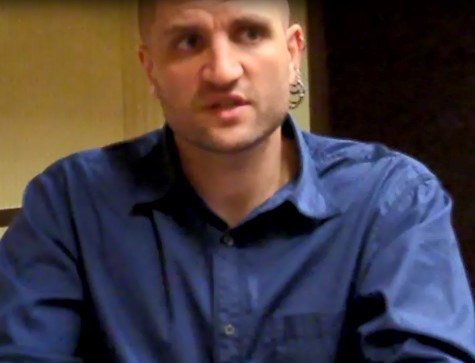China Mieville kaffeeklatch at the Readercon 2006
China Mieville held a kaffeeklatch at the Readercon 2006, at which he chatted with the audience about writing, politics, and other topics.
On how wanting for a narrative to have a beginning, a middle and an ending is problematic
The kind of obsessive desire to narrativize, to close, and to have an ending after the middle, which came after the beginning, is a problem, and a problem I want to kind of strain against. And as I also said, it’s something you can’t succeed at.
I think he means that it is impossible to escape narrative.
Intrinsically, everything you write is a narrative. But even though you can’t escape it, you can still try to fail interestingly.
An an example of that, he cites his story “The Tain” from the collection “Looking for Jake”.
[On one hand,] it is “highly structured: it has a beginning, it moves through, there is a crisis; […] and then there is a resolution, but a resolution in this sense is the acknowledgement of structurally apparently heroic protagonist, that not only he can’t win, but he’s already failed.”
The culmination of this short story is not about a failure, it is about an acknowledgement that the failure happened some time ago. So in a sense, the whole of “The Tain” is a coda to a story that’s already happened. “The Tain” is an epilogue. The real story is the story of the war, and we lost. So what we are reading is an epilogue, and the ending is a surrender. You don’t often read about surrenders in war stories, so as any writer you want to do something new — that would be interesting, let’s do that.
What was important to me in that story is not that they tried and failed, it was that they realized they failed ages ago.
Somebody asked him about his graphic short story “On the Way to the Front”. China Mieville said that while none of the readers liked it, he himself did. Apparently the person who brought up this topic asked him to explain what it was about, and whether this story was historical, or if it was a speculative piece set in a parallel world. To which China Mieville replied: “That comic doesn’t make it quite clear what was that is: that’s the point.”
In everyday world, conflict appears to be a pathology, but I don’t think it is. I think it is the underpinning of the everyday world. So what it is about, it is the notion that supposed gap, which is only ever an illusory gap, in that particular case is just a little bit narrowed, so that these tendrils of this very unclear conflict keep poking into the everyday.
It’s a very similar notion that underpins “Foundation” and “Go Between” in the same collection. The notion of the violence underneath the everyday. That’s what it’s about. That you walk out of your house and you are on the way to the front.

On the question how all the different life forms could have evolved on Bas Lag
My friend R (he and his wife D hosted me at their house on my trip to Boston, and attended the Readercon with me) asked China Mieville how such a great variety of sentient life forms could have evolved on Bas Lag. Bas Lag civilization has no spaceflight, so all those species must be native to it.
China Mieville said that he never pursued any kind of scientific consistency in his fiction, and that “Perdido Street Station” is full of scientifically infeasible things. For example, giant beetles would not be able to breathe, but he as them in his book anyway, because they are cool. So if someone wants to raise those objections, they have many more examples to pick on.
Also, you are making an assumption that Bas Lag is a planet. Confession: Bas Lag is not a planet. Its cosmology is explained in “The Scar”. And these races, how did they evolve? By magic. It doesn’t bother me. In real world I am very interested in evolution and biology and all of this, but for the purposes of fiction, if I think of a cool alien race, I’m not going to sit down and worry how it progressed.
On the difference between science fiction and fantasy
As I’ve said many times, I simply don’t buy the distinction between the two. The distinction between fantasy and science fiction is a totally spurious distinction. The idea that science fiction is based on rationality, and fantasy is based on magic and myth and stuff, I think it’s just ridiculous. Some science fiction uses rigorously accurate science, some invents science, some basically says abra-cadabra, but does it with equations and quantum physics. There is a continuum. And this is where, for me, what links these things, and I said it another time, is a question of vision. These things are different iterations of visionary fiction.
On soccer
I’m not sure why someone asked China Mieville about soccer — I think because there was a World Cup going on at that time — and he replied that he doesn’t give two s**ts about soccer, but would enjoy to see England defeated by one of its ex-colonies.
On his writing influences
I think the question of influences is a complicated question, because there are several different questions: what books do you like? What books do you read? What books do you read often? What books did you read when you were young? What books are you aware of being influenced by? What books do you think you might have been influenced by? What books other people say you were influenced by? These are very different questions. I love Philip K. Dick, but I don’t find myself riffing off of Philip K. Dick at a conscious level.
However, there was some influences I forgot about, because they became like spectacles that I sort of think through, instead of seeing them in the way.
And then there’s being influenced by things you haven’t read. You can easily be influenced by things you haven’t read, if they invented the culture. We are all influenced by Dante, we are all influenced by Dickens, whether or not we’ve read them. So the question of influences is much more slippery than people sometimes think it is. All I can say is, at a conscious level, [Ursula] LeGuin is an influence, although not an enormously looming one. [Octavia] Butler is less of an influence, although I admire her very much.
There were more questions people asked, from which I didn’t get good enough notes, at least none that would lead to coherent paragraphs. There was one uestion that seemed to be based on a comical misunderstanding of Mieville’s fiction. (Perhaps it made more sense in the context of the conversation, I don’t know.)
Audience member. So do you think your fiction is more about stability, then?
China Mieville. No, I don’t think my fiction has anything to do with stability. I think my fiction has to do with change and dynamism. Be it violent, be it peacefull, but it’s all to do with motion. Fecundity, for me, is precisely to do with motion. I’m not interested in stability. In fact, I find the idea of stability quite frightening.
I’m not sure who could read anything by China Mieville and think it’s about stability. But, like I said, maybe the question made more sense in context. The previous question by the same person had something to do with fecundity and British SF/F. Hence, the mention of fecundity in China Mieville’s answer. The question-asker thought that fecundity must be some kind of fundamental trait of British SF/F, and quoted J. G. Ballard (especially his novel “Highrise”) as an example of that, but China Mieville was baffled by this notion, and said that Ballard’s fiction was more about collapse and ruin.

On politics
People also asked questions about China Mieville’s involvement in politics. In my infinite wisdom, I didn’t record the questions people asked, only China Mieville’s answers, so now I am left to guess what exactly he was responding to.
I think, to be a political optimist is not to think that everything will go your way. It is not to think that everything will be all right. It is to think that there’s a decent chance that things will be OK. It is to think that the risk of attempting to make things better is worth it. That’s all you need.
About Peak Oil
Peak Oil, in a broader sense, means oil is going to run out. That’s clearly true, there’s not debate about it, the question is “when”. Have we passed the peak, is it in 10 years? To me, to an extent it is an angels-on-pinheads argument. Of course, it makes a difference, but it’s not the key issue. And when people say “we are using a lot of oil now, [so when it’s going to run out things will be really bad]” — it’s trapped in the way things are now. If we changed the nature of the society, we wouldn’t need to use the oil the way we use it now. We might find completely different uses for it.
The above illustrates the undercurrent running through much of what China Mieville said about his political involvement. It is to show people that a different world is possible. He also doesn’t believe that people don’t vote not because they are ignorant of the benefits of voting, but because they feel powerless.
The thing is, I think people do think, and they do talk, but they feel powerless. And part of the reason why they feel powerless, is that they are constantly told that they are the only ones feeling that way. And I don’t think that’s true. And I think one of the most important things you can do is simply insist that another world is possible, another agenda is possible, you can have a debate. So, to answer the question, I can’t tell people individually what they should be doing, but you’re right that an individual one is very atomized and very broken, which is why I’m an advocate of collective action, I’m an advocate of trade unionism, I’m an advocate of the collectivism and mass movements. I think the idea of trying to do something on your own is either doomed to failure, or is elitist. But I’m not gonna comment with anything that’s gonna surprise you.
He was a little more specific about his views in his Readercon 2006 Guest of Honor interview.